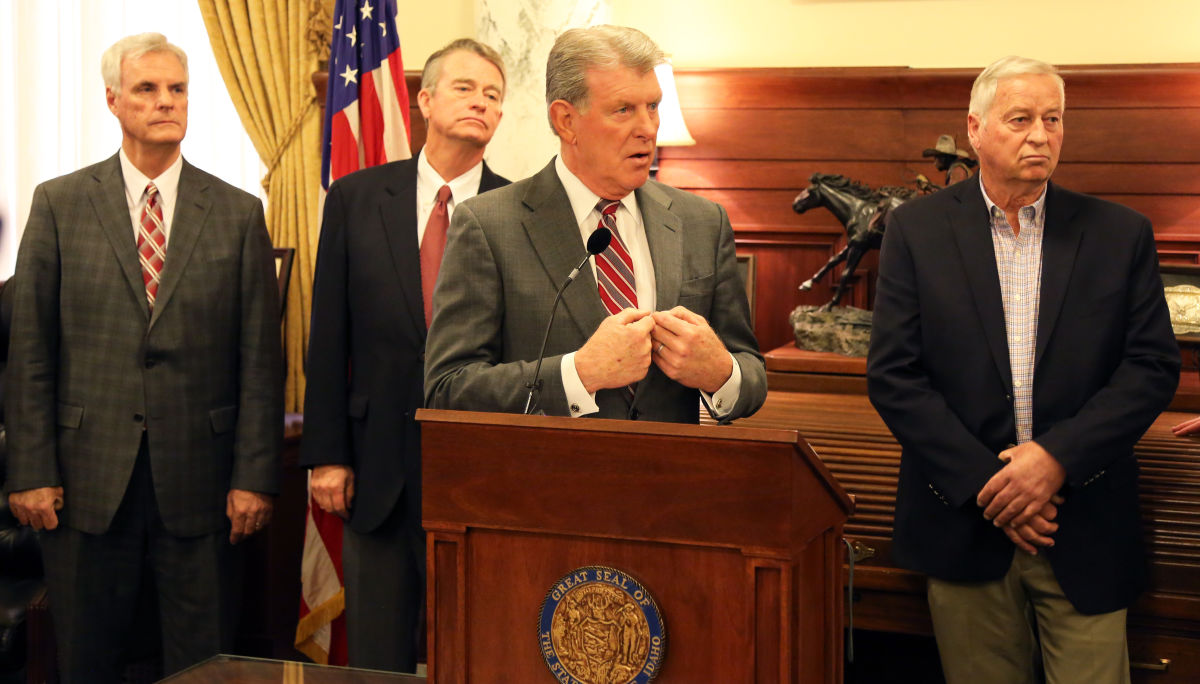(UPDATED, 3:35 p.m., with statement from Wasden.)
Attorney General Lawrence Wasden’s staff told state officials that they could split the ill-fated Idaho Education Network broadband contract, Gov. Butch Otter said Monday.
The decision to break the contract into two parts pushed the state into a legal quagmire that still plagues the state’s elected officials, seven years later. Courts threw out the $60 million high school broadband contract, saying the restructuring rendered the agreement null and void.

During a Monday news conference recapping the 2016 legislative session, Otter suggested Wasden’s office contributed to the legal confusion.
The decision to split the contract was spearheaded by Mike Gwartney, a longtime Otter confidante who had headed the state’s Department of Administration at the time. The 2009 split gave Education Networks of America and CenturyLink shares of the project — and prompted Internet vendor Syringa Networks to take Idaho to court.
An Ada County district judge ruled the split contract was void — a ruling upheld by a unanimous Idaho Supreme Court earlier this month.
Flanked by about a dozen legislators, Otter suggested lawmakers have had an “epiphany” that the demise of the Idaho Education Network cannot be pinned to one person — an apparent reference to Gwartney. But Otter stopped short of affixing blame.
“We’re beyond blame,” Otter said Monday. “We’ve got a problem. We’re trying to solve the problem.”
In a statement, spokesman Todd Dvorak said Wasden and Otter haven’t discussed the matter.
“At this point, neither the governor nor anybody from his office has spoken directly with the attorney general about this aspect of the IEN litigation. As a result, we’re in the unfortunate position of getting this information secondhand and through the press,” Dvorak said. “That being said, what’s clear right now is the conclusion and direction of the Idaho Supreme Court, which reviewed evidence, depositions, testimony and countless records in reaching its recent decision in this litigation.”
The governor’s remarks came amidst growing intraparty tension between GOP legislators and Wasden. And it comes as the Legislature once again had to come up with extra money to try to clean up after the Idaho Education Network mess.
This session, the cleanup work came in the form of an $8 million budget line item to cover a possible settlement with Education Networks of America and CenturyLink. Both vendors have filed tort claims with the state, demanding unpaid payments on the project. Legislative leaders say that the vendors’ claims could reach $11 million.
Legislators pushed through the $8 million budget in the final days of the 2016 session; it now goes to Otter’s desk. Otter said he supported allowing legislative leaders to pursue a settlement and try to save the state some money in the process.
Otter’s traditional postsession news conference was dominated by questions about health care. For now, the governor ruled out a special session to address health care for the 78,000 Idahoans who do not qualify for Medicaid and cannot secure insurance through the state’s health care exchange. But the news conference also was punctuated by comments on education:
- Otter lauded the Legislature for boosting K-12 funding by 7.4 percent, about a $109 million increase — even though Otter had requested a 7.9 percent increase.
- Otter fired back at critics of one piece of the budget — boosting district “operational spending” to $25,696 per classroom, a level last reached in 2008-09. Critics overlook that the state has put additional money into needs once covered through operational budgets, citing the $73 million of new money added to teacher salaries in the past two years. “There’s a lot more money in that classroom than that 2009 figure.”
- Otter chided some school districts for the way they have awarded teachers’ leadership premium bonuses, and for failing to accurately report their teacher evaluation results. As the state puts more money into schools, he said, accountability will be a watchword.
- Otter again did not tip his hand on the Bible-in-schools bill that now sits on his desk. Wasden’s office has said the bill violates the Idaho Constitution. Otter said he hasn’t yet discussed the bill with his staff. “Everything is subject to running through my attorney,” he said.
